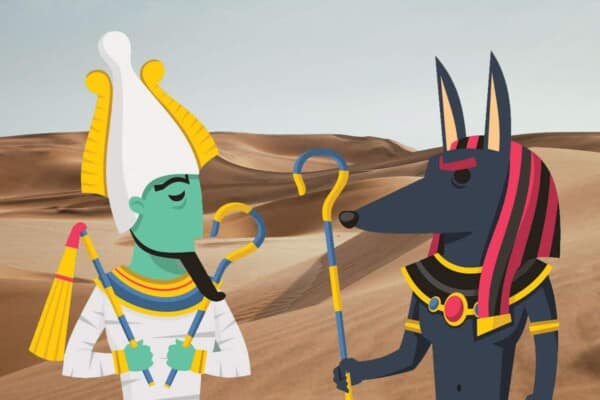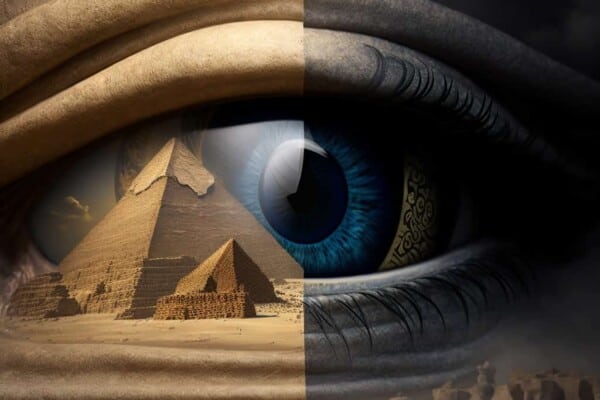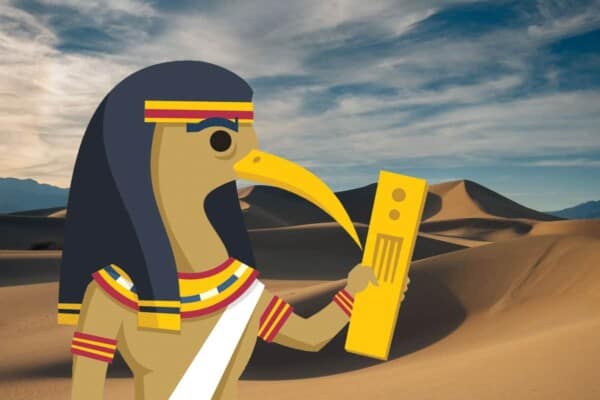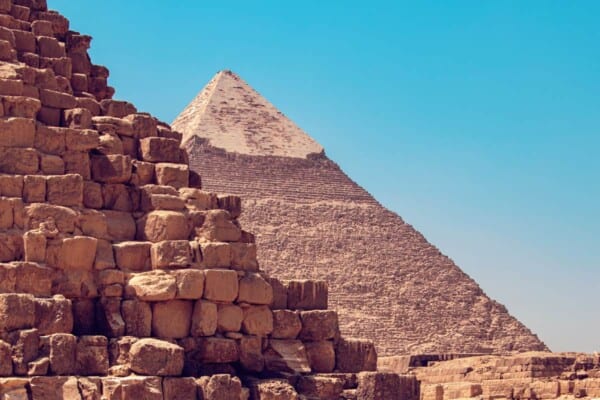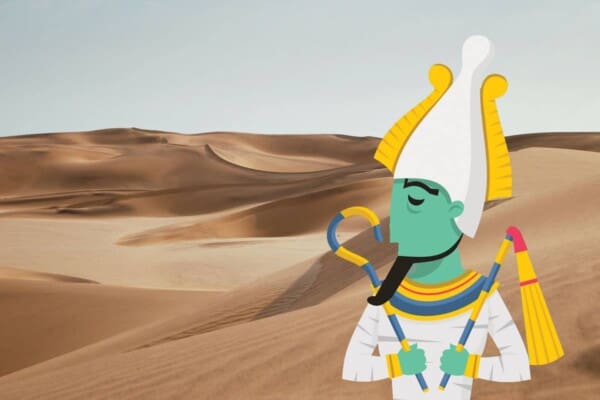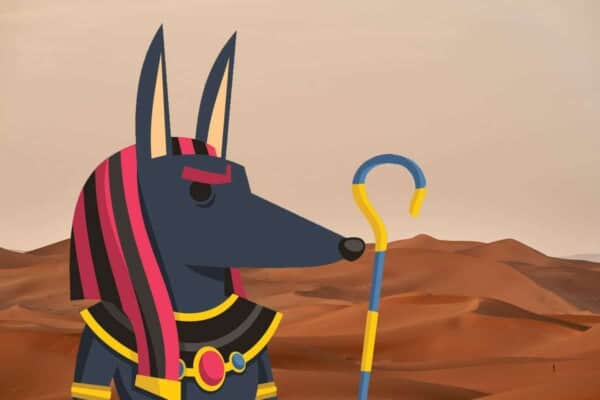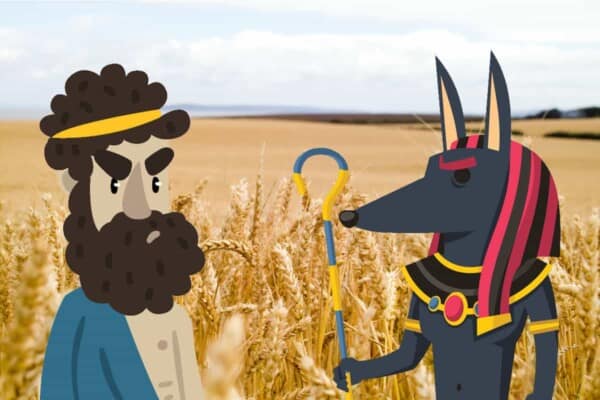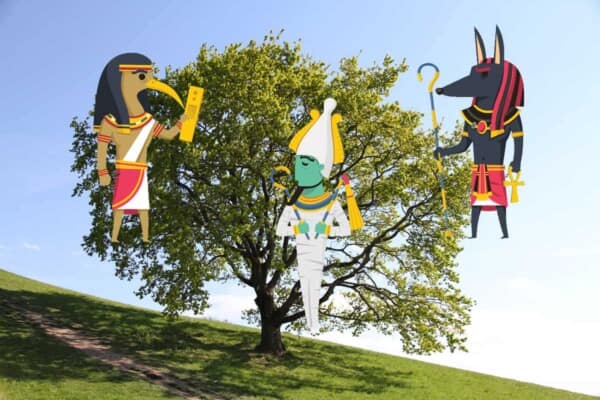There are centuries worth of plays that are still performed today from Greek and Roman mythology. Bollywood continues to tell the various stories of Hindu deities, saints, and stories stemming from the faith. Even Christianity has movies with fairly accurate accounts of biblical stories. But when it comes to Egyptian mythology, all attempts at anything accurate to lore or historical cannon goes out the window in favor of curses and mummies, the occasional zombie, or other spectacles.
So if you’re looking for accurate renditions of traditional myth and lore, movies are probably not the best place to look. If you’re looking for a good time, some foundation in Egyptian lore, some drama, some adventure, or both, these movies have got you covered.
What are the Best Egyptian Mythology Movies?
1. The Mummy (1999)
Back in 2021, archaeologists unearthed a previously unidentified tomb containing 2500-year-old mummies with golden tongues. And if there is any movie that could act as a warning against digging up ancient mummies, let alone those with golden tongues, it would be The Mummy.
The 1999 film is a remake of the 1992 version of The Mummy and stars the beloved fantasy and sci-fi adventure niche actor, Brandon Frazer. Frazer plays Rick O’Connell who travels to the City of the Dead alongside a librarian and her older brother, respectively played by Rachel Weisz and John Hannah. During their adventures, they awaken the mummified remains of Imhotep.
The story of Imhotep alone would make an incredible movie. He was an Ancient Egyptian architect and high priest. Now in most cultures across the world, humans are not deified in life or later. It’s a rare thing. But the Egyptians were an exception. There are quite a few examples of pharaohs being elevated to the status of a god and worshipped as such. Imhotep was one of the only documented non-royal beings who were given that status. His influence reached through much of Ancient Egypt and into the contemporary world.
But in this movie, Imhotep was also considered evil and cursed. Although the argument could be made that he wasn’t the true villain of the story, we’re not going to go into that here. No spoilers, right?
2. The Mummy (2017)
As if the 1999 rendition of The Mummy wasn’t already a cult classic, another version of The Mummy came out in 2017. While the storyline was relatively similar to its 1999 counterpart, it does take a different approach to Egyptian mythology. Namely, rather than waking the mummy of Imhotep, they awoke the mummy of Princess Ahmanet who was not based on a real person.
Merging mummies, Egyptian mythology, and a little bit of zombieism, The Mummy isn’t entirely based on Hollywood-esque notions of Egypt. Namely, Princess Ahmanet (who may have been given her name as a homage to Amunet, the deity and consort to Amun) draws her powers from Set – the deity of chaos, disorder, deserts, and foreign lands. Additionally, the initial depiction of Egypt does leave the viewer with the ability to infer what things may have looked like with all their color and newness although the film-makers conveniently left out a clear chronology and don’t accurately provide a specific time period for their cursed princess. What little ancient Egyptian that is spoken in the film, archaeologists and Egyptologists have called ‘passable’ and the film does draw on some burial practices but those have definitely been altered by Hollywood.
Don’t expect it to be academically accurate but viewers can still get a slight taste of actual mythology. And with a cast with Tom Cruise and Russell Crowe, views can be certain it will be filled with action and mayhem.
3. Gods of Egypt (2016)
Gerard Butler stars in this mythology-inspired action film. Like any good action story, it also follows a romance between a renegade and their love. In this case, the story seems to be inspired by the stories detailing the conflict between Horus and Set in Ancient Egyptian lore.
The basic premise is that Set – god of chaos and destruction – takes over rule from Osiris and Isis and proceeds to lead with an iron fist and forces mortals to pay their entry into the afterlife in treasures and gold. The story really starts about a thousand years after this when Horus – god of the air and wind – teams up with a mortal named Bek to take back the throne and to rescue Bek’s lover from the Afterlife.
While the actual conflict between Set and Horus is canon in Egyptian mythology, that’s about all that is canon in this movie. According to Egyptian lore, Horus’s mother Isis had told him to protect the people of Egypt from Set who had, in fact, killed his father, Osiris. After years of conflict and strife, Horus eventually did take the throne from Set.
Go into Gods of Egypt thinking of it as fan-fiction for this tale, and as long as you can ignore the primarily white casting, you might enjoy it.
4. Cleopatra (1963)
Violet-eyed, ruby-cheeked, and absolutely stunning Elizabeth Taylor plays Cleopatra. But before we get too far into the details of the movie, it’s worth reflecting on contemporary obsession with the actual Cleopatra.
Biographer Stacy Shiff writes in ‘Cleopatra: A Life’, ‘Among the most famous women to have lived, Cleopatra VII ruled Egypt for twenty-two years. She lost a kingdom once, regained it, nearly lost it again, amassed an empire, lost it all. A goddess as a child, a queen at eighteen, a celebrity soon thereafter, she was an object of speculation and veneration, gossip and legend, even in her own time. At the height of her power, she controlled virtually the entire eastern Mediterranean coast, the last great kingdom of any Egyptian ruler. For a fleeting moment she held the fate of the Western world in her hands. She had a child with a married man, three more with another. She died at thirty nine, a generation before the birth of Christ. Catastrophe reliably cements a reputation, and Cleopatra’s end was sudden and sensational. She has lodged herself in our imaginations ever since. Many people have spoken for her, including the greatest playwrights and poets; we have been putting words in her mouth for two thousand years. In one of the busiest afterlives in history she has gone on to become an asteroid, a video game, a cliche, a cigarette, a slot machine, a strip club, a synonym for Elizabeth Taylor.’
Cleopatra, the movie, is a historical drama built upon the life of many mysteries of its protagonist. It begins with Cleopatra convincing Caesar to give her the throne in place of her brother and continues to document her life as queen. The filmmakers and screenwriters took quite a few liberties (as they often do) in building up their version of Cleopatra as a megalomaniac and power-hungry – which she very may well have been. Nonetheless, this version of her could be more of a reflection of the racism and sexism of the era than it is an honest attempt to depict the life of someone whose influence has been around since before Christ.
In any case, the movie is a great opportunity to witness one of many accounts of her life and understand the pull she’s maintained since she actually lived over 2000 years ago.
5. Exodus: Gods and Kings (2014)
When it comes to Egypt and its lore, it’s fair to consider biblical accounts as modern. And that’s what Exodus: Gods and Kings is – a biblical account. Starring Christian Bale as Moses and Joel Edgerton as Ramesses II, it offers a cinematic account of the story of Moses.
Moses is one of the most important prophets in Judaism, Christianity, and Islam. His story is found in the Book of Exodus in the Old Testament and the Quran. Further details of his life are also found in rabbinical texts such as the Talmud. Essentially, he was the leader who freed the Israelites from beneath the reign and enslavement of Egypt.
The movie begins with a prophecy directed at Moses and Ramesses who are generals of the Egyptian royal family. The prophecy says that a leader will be saved and the savior will someday lead. This sets the tone and pace for the rest of the movie as Moses witnesses the treatment of enslaved Israelites and discovers his own birth lineage as being one with theirs. Eventually, this all leads to the basis of the well-known story – the ten plagues and Moses leading the Israelites out of Egypt and becoming their leader.
While the movie received praise for its acting and special effects, it was heavily criticized for its inaccuracies, both biblical and historical. Egypt and the United Arab Emirates went as far as to ban it altogether. Directed by a self-identified atheist, did not follow the scriptural stories and like many Hollywood movies depicting religious stories or biographical accounts, is best viewed through the lens of fan fiction.
6. The Prince of Egypt (1998)
The only animated film on this list, the Prince of Egypt is considered a Dreamworks classic. It is also an adaptation of the story of Moses. Containing all the up-beat, stuck-in-your-head music of any Dreamworks animated musical, it follows the life of Moses from his short time as a prince or general of Egypt to fulfilling his ultimate role of freeing the Israelites from enslavement and leading them out of Egypt.
The actors cast for voice roles is nothing short of legendary and include Patrick Stewart, Jeff Goldblum, Danny Glover, Steve Martin, Sandra Bullock, and Michelle Pfeiffer.
What Prince of Egypt does really well is telling the story of Moses in a method that is more child-friendly than its live-action counterparts while also maintaining more nuance and truth to the biblical account. In general, it’s considered one of the best biblical movies alongside The Passion of Christ and The Ten Commandments.


